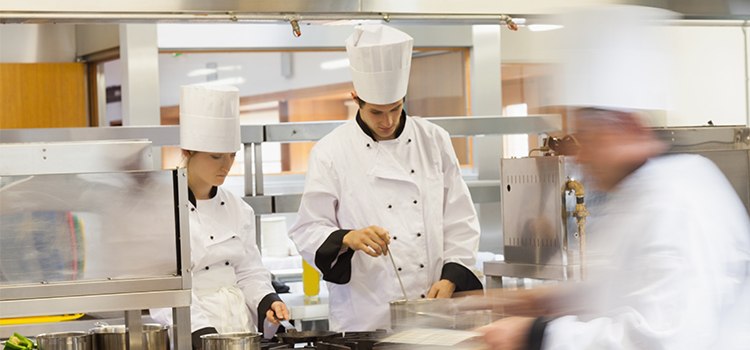Chef Job Description
This executive chef info will tell you if you have what it takes to succeed.

A chef job is more than a profession—it's a passion. And in the right hands, food is much more than a biological necessity. It's an art form meant to be savored. Unlike other mediums that can only be appreciated through sight or hearing, good food is meant to be consumed and appreciated with multiple senses.
With their mastery of food and flavor, chefs evoke a variety of reactions. A good chef can nourish the body and please the palate, leaving us satisfied and wanting more at the same time.
Of course, this is no small accomplishment. Specialized culinary training and professional dedication are key ingredients in the recipe for success. The time you spend in culinary school will help you hone your natural talents and prepare for a successful culinary career.
Chef Job Description and Duties
An executive chef job description includes a diverse set of tasks. The duties of an executive chef may include the following tasks:
- Creating a menu
- Choosing a restaurant theme
- Food preparation
- Managing employees
- Establishing and maintaining contacts with vendors
- Marketing
- Overseeing customer relations
Skills Needed for a Chef
- Sensitive Palate – Chefs need keen senses of taste and smell. The best chefs recognize subtle nuances in flavors. This ability allows them to explore bold new flavor combinations and make them work.
- Creativity – Truly successful chefs put their own twist on familiar dishes and create new combinations. Creativity and a flair for experimentation are essential traits of top chefs.
- Teamwork – A harmonious meal requires cooperation in the kitchen. Whether you're working in an executive chef job, directing the whole process, or as a line cook preparing a specific element of the meal, teamwork is essential. Executive chefs have to be able to manage workers, delegate responsibility and work closely with others.
- Determination – Having a career that you're not only passionate about, but also meets an essential need for people, is worthwhile and satisfying. However, aspiring chefs should be prepared to work hard. A chef job may require working on evenings and weekends and spending long hours on your feet. Restaurant kitchens are fast-paced and often stressful. Successful chefs have to be dedicated to their craft in spite of some of the less glamorous aspects of the job.
- Organization – Bringing all the elements of a meal together quickly and elegantly takes preparation and organization. The ability to plan ahead will help you keep your cool in a high-pressure kitchen environment.
Culinary Arts Schools & Careers
- A Professor's Advice About Culinary Schools
- Chef Interview: An Inside Look at Chef Jobs
- Chef Job Description
- Chef Job Outlook
- Choosing a Culinary Arts Program
- Compare Culinary Careers
- Cooking School Student Profile
- Culinary Arts Salary Information
- Culinary Arts Schools Offer Career Help
- Culinary Externships Equal Work Experience
- Culinary School and Career Resource Center
- Find Local Cooking Classes to Fit Your Goals
- Helpful Resources for Culinary Careers
- Is Culinary School Worth the Time and Tuition?
- Jobs for Chef School Graduates
- Recreational Cooking Classes
- Top 10 Essential Cooking Tools
- What is Culinary School Really Like?
FIND A CULINARY SCHOOL TODAY
Tell us a little about yourself and we'll connect you with schools that offer culinary arts programs.
